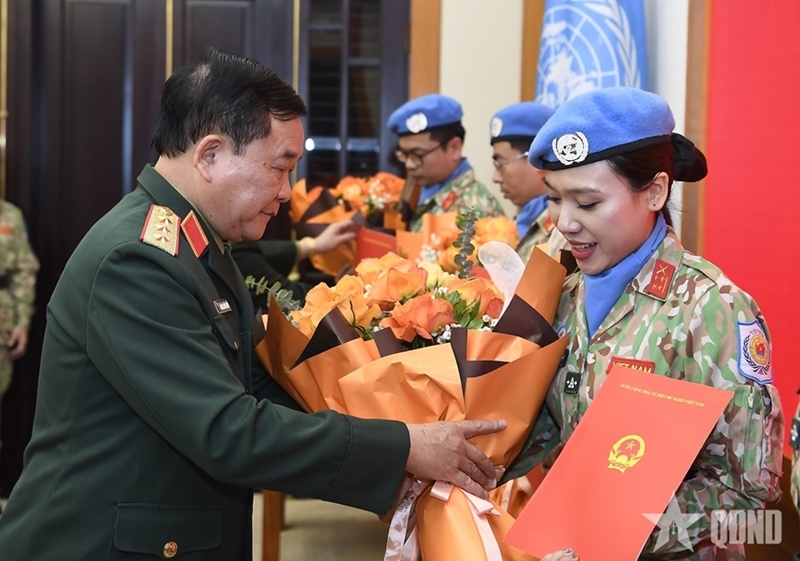Permanent member of the Central Military Commission (CMC) and Deputy Defense Minister Sr. Lt. Gen. Hoang Xuan Chien underscored that in his article posted on the People’s Army Newspaper on its September 26 issue.
In his writing, the defense leader emphasized that in the 2020-2025 term, in the context of rapidly changing and complex global and regional situation, the CMC and Ministry of National Defense (MND) have led the implementation of international integration and defense diplomacy work in a comprehensive, flexible, and effective manner, achieving significant results.
    |
 |
|
Sr. Lt. Gen. Hoang Xuan Chien hands over decisions to servicemen to take on U.N. peacekeeping duties. |
He said that global competition among major powers, prolonged conflicts, and non-traditional security challenges, such as Covid-19 and climate change posed difficulties. At home, political-social stability and defense investment advanced, but hostile forces intensified sabotage, affecting all working aspects, including international integration and defense diplomacy. In that context, international integration and defense diplomacy became a strategic pillar of national building and defense, helping prevent conflicts and wars early and from afar, contributing to raising Vietnam’s international standing, and providing resources for building a revolutionary, regular, elite, and modern people’s military.
According to Gen. Chien, the CMC and MND directed the whole military to implement the tasks of international integration and defense diplomacy under the motto “active, pro-active, prudent, flexible, and effective,” with remarkable outcomes in both bilateral and multilateral scope, enhancing trust in and prestige of Vietnam and its military internationally.
The whole military has embraced and realized higher-level resolutions, conclusions, directives and regulations on the two tasks. Its agencies and units have pro-actively researched, made accurate forecasts of regional and global situations to give timely suggestions to deal with emerging situations in an effective manner.
Bilateral defense cooperation remains a top priority and central focus in Vietnam’s defense diplomacy. It has been implemented in a comprehensive, substantive, and effective manner, making practical contributions to strengthening political trust, maintaining friendly relations with other countries, and effectively serving the cause of building and safeguarding the Socialist Republic of Vietnam.
So far, Vietnam has established defense ties with over 100 countries, including all U.N. Security Council permanent members and all major powers worldwide. Relations with neighbors have been prioritized and deepened, ensuring border of peace, stability, cooperation, friendship and development. Bilateral cooperation has expanded across exchanges, border defense friendship programs, ministerial dialogues, joint exercises, training, research, maritime security, humanitarian assistance, and war legacy settlement.
Multilateral defense diplomacy has been advanced, with active participation in ASEAN-led mechanisms, the Shangri-La Dialogue, Moscow Security Conference, Beijing Xiangshan Forum, and U.N. peacekeeping operations.
Attentively, since 2014, Vietnam has deployed 1,319 personnel to U.N. missions in South Sudan, the Central African Republic, and Abyei, earning recognition from the U.N. and international community. Vietnam has also contributed to humanitarian relief, including earthquake response in Türkiye in 2023 and Myanmar in 2025.
As host, Vietnam successfully organized ASEAN defense events, Army Games events, and particularly the Vietnam Defense Expo (2022, 2024), attracting major global defense companies and showcasing the country’s growing potential and credibility, opening more cooperation opportunities for defense industry development.
It can be affirmed that, with its distinctive and strategic role, Vietnam’s defense diplomacy has increasingly demonstrated strong political stance, strategic vision, and flexible adaptability to the rapidly changing international environment, contributing to achieving strategic goals of defending the Fatherland, upholding peace, stability for national development.
To enhance the effectiveness of international integration and defense diplomacy, serving national construction and defense in the new era, the defense leader said that the whole military should focus on five key tasks and solutions.
Firstly, they should continue thoroughly grasping and effectively implementing high-level resolutions, directives, and guidelines on international integration and defense diplomacy. This ensures correct orientation and practical outcomes. A consistent application of Vietnam’ foreign policy along with the “Four No's” defense policy remains the fundamental principle guiding all activities on international integration and defense diplomacy.
Secondly, they should strengthen research, grasp and make accurate forecasting of situational developments, and provide timely strategic advice on the work. Military agencies and units must closely coordinate with relevant bodies to monitor developments in the world, the region, and the East Sea (aka South China Sea), as well as adjustments in major powers’ policies and non-traditional security challenges, ensuring pro-active and effective responses.
Thirdly, the quality and effectiveness of both bilateral and multilateral defense cooperation should be raised. Priority should be given to neighbors, major powers, ASEAN members, and traditional partners, while expanding ties with other potential countries. Cooperation should cover border defense exchanges, maritime security, war legacy settlement, training, defense industry, humanitarian assistance, disaster relief, military medicine, and U.N. peacekeeping. Focus should be made on military-technical cooperation coupled with defense trade and technology transfer, as well as joint production and distribution of defense products, in order to promote the modernization of weapons and equipment and enhance operational capabilities of the military. At the same time, multilateral cooperation should be elevated in line with Vietnam’s proactive and responsible international role.
Fourthly, a capable contingent of defense diplomacy officers with strong political stance, good ethics, professional expertise, foreign language proficiency, and practical skills must be built.
Finally, coordination and dissemination of information about international integration and defense diplomacy should be strengthened, thereby elevating Vietnam and its military’s prestige and creating synergy to firmly safeguard the Fatherland.
Translated by Mai Huong